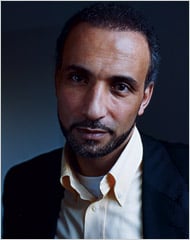Hello everyone, it's Pat Frost from FPA's Central Asian blog doing a guest post.
Now this piece is far from ripped off the front page headlines, but the issue is still as vibrant as ever and continually is debated in my mind: Is Tariq Ramadan, a European Muslim with an elite Islamic past (he is the grandson of Hasan al-Banna, the founder of the Muslim Brotherhood) who, though an academic, has brought the issue of a shared and existing muslim-european identity to the main stream, a dangerous public figure or a positive force for change in both the mindset and views of both Westerners and Muslims around the world?

This debate of Tariq Ramadan's influence, whether it be positive or negative, was magnified by an astounding literature review and analysis of all his works and statements by the New Republic's Paul Berman. Berman's ‘Who's Afraid of Tariq Ramadan‘ sought to counter what Berman believes was a too complimentary and shallow literary piece on Ramadan by Ian Buruma in the New York Times Magazine. Berman rightly compliments the many positive aspects of Ramadan, his discussions and pronouncements about the rights of women and the wrongs of extremist and terrorist actions in the muslim community, but he still asserts that Ramadan lives in a double world, at one time he is denouncing the London 7/7 attack, but at the same time he will mention that it may have been justified if looked at from another way. Berman calls Ramadan's language ‘exceptionally flexible’, and this is not a compliment. Berman's reasons and evidence portraying Ramadan as a rather conflicting and ambiguous figure in the ways he supports true liberalism and western ways is thorough, but complicated and if you have the time I suggest you read his whole piece.
Berman's piece on Ramadan garnered quite a lot of attention, largely very critical. Here is well-written retort to his allegations. And for a more moderate view, here is Jonathan Laurence's review of Ramadan's most recent book ‘In the Footsteps of the Prophet: Lessons From the Life of Muhammad‘, who, though spends most of time complimenting Ramadan and his message to Europeans, European-Muslims, and Muslims around the world, concludes by criticizing him for his slippery discourses and for still having a ‘gray area’ on several important issues, specifically terrorism.
Tariq Ramadan is indeed a controversial figure, anyone would be who would try to accomplish what he is attempting, that is trying to maintain legitimacy in two societies and worlds, the west and the Islamic. In many ways, the world will need more figures like him to help bridge the gap and create openings for discussions and debates are some of the most crucial questions of our globalized society. But just as we need people with dual legitimacy, we need thinkers and journalists like Paul Berman, who refuse to allow 'slippery’ thoughts and language when it comes to fundamental rights and wrongs.
What do you think?
(Photo Source: New York Times Magazine)